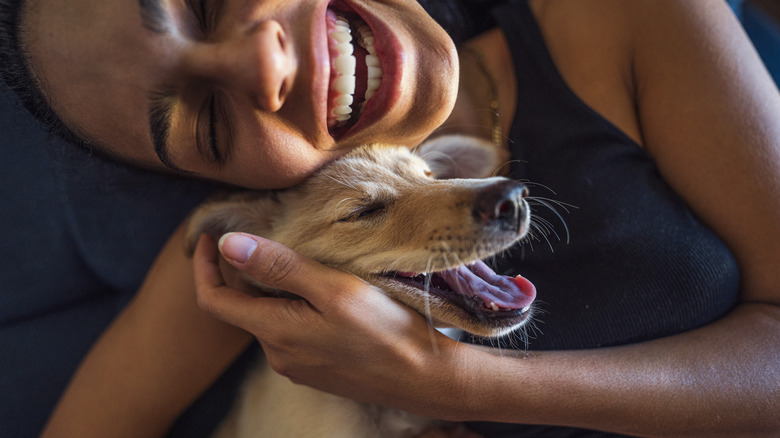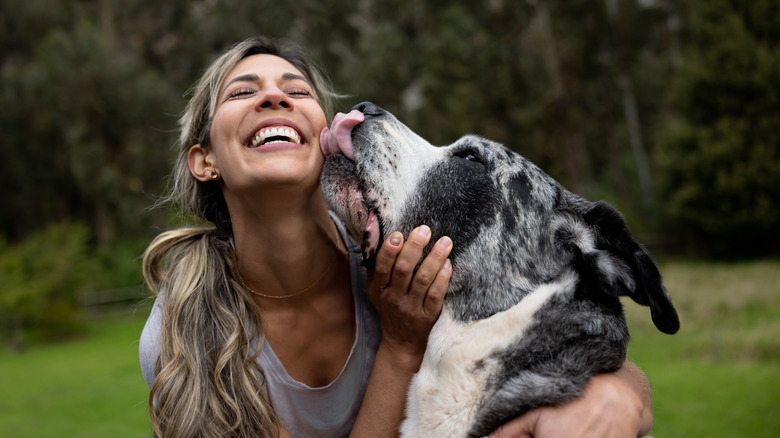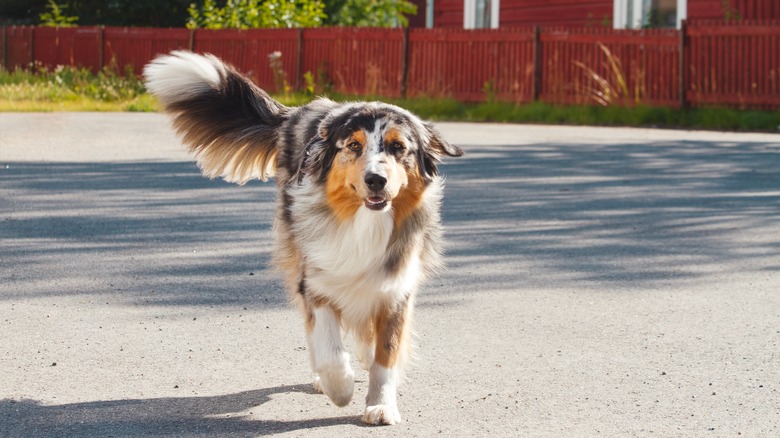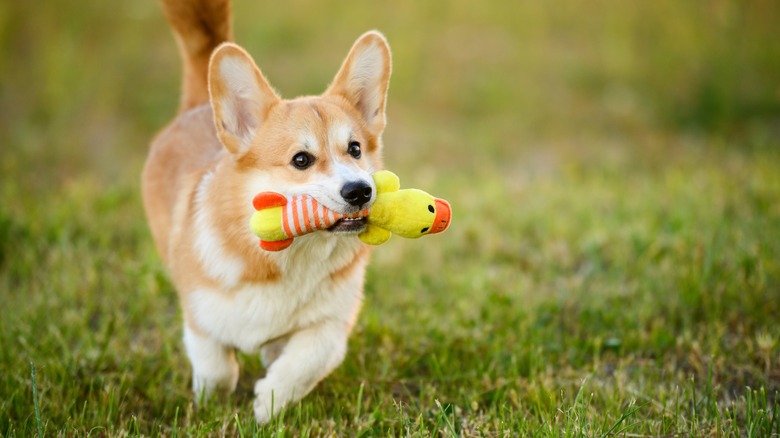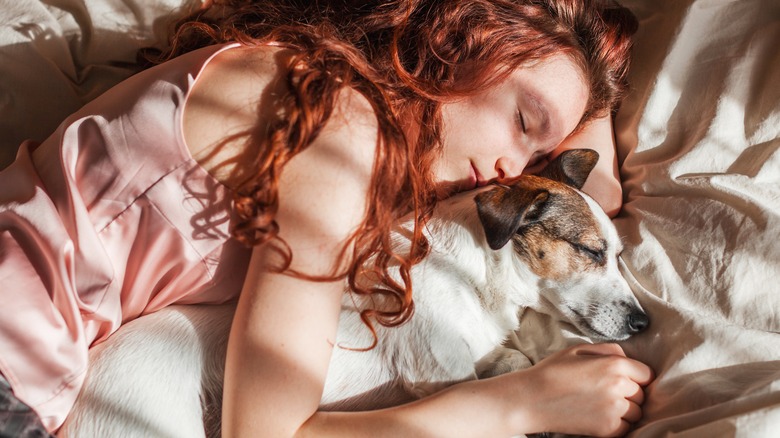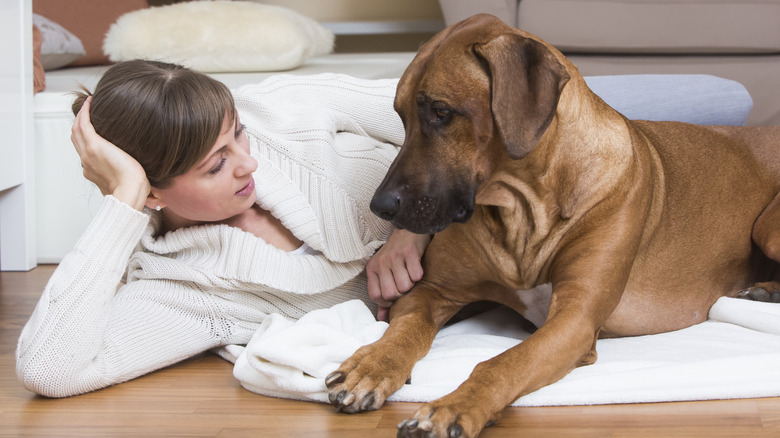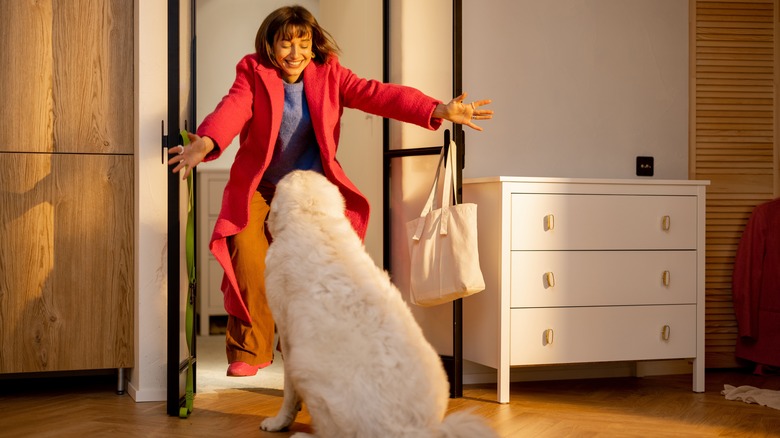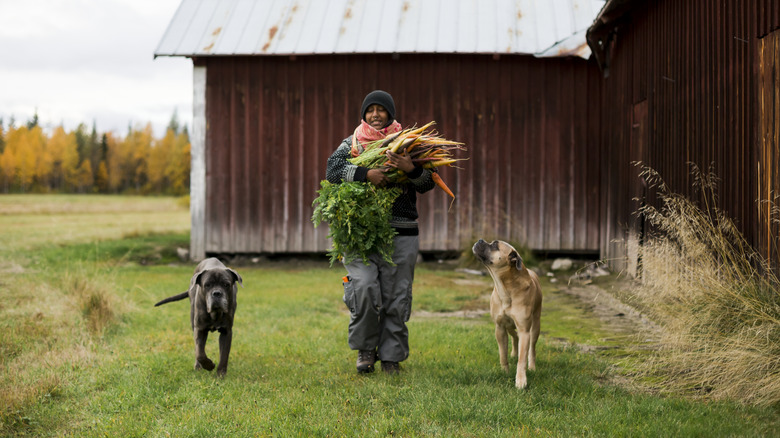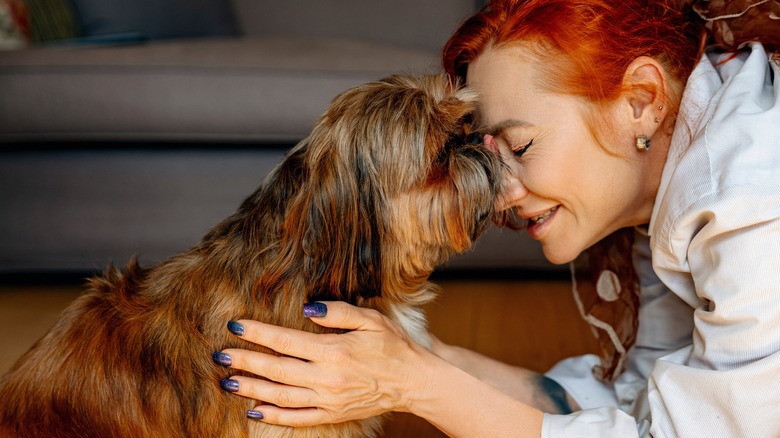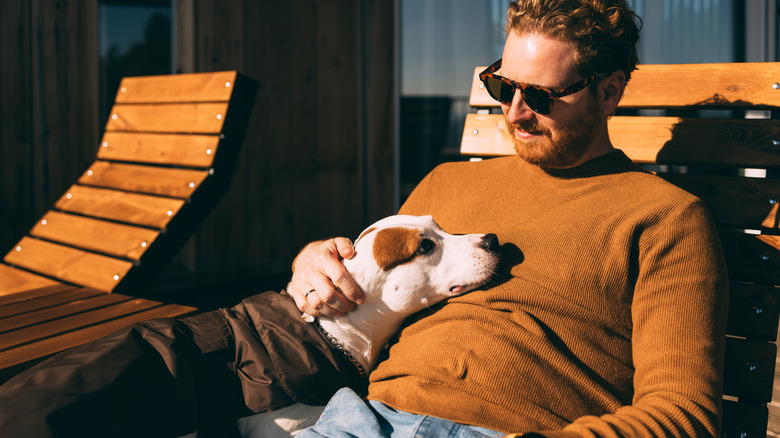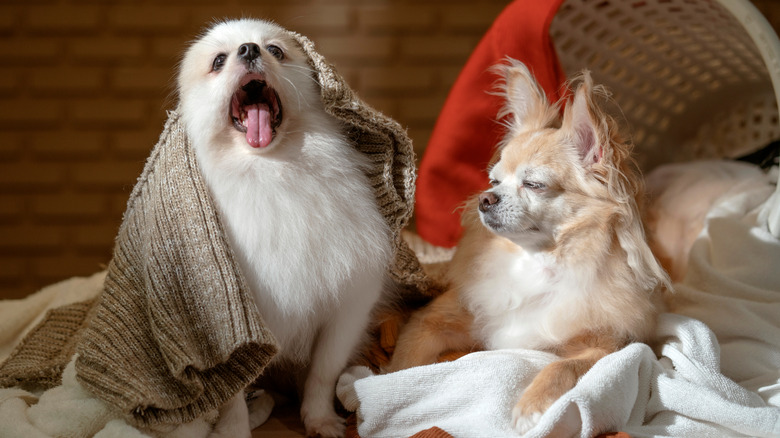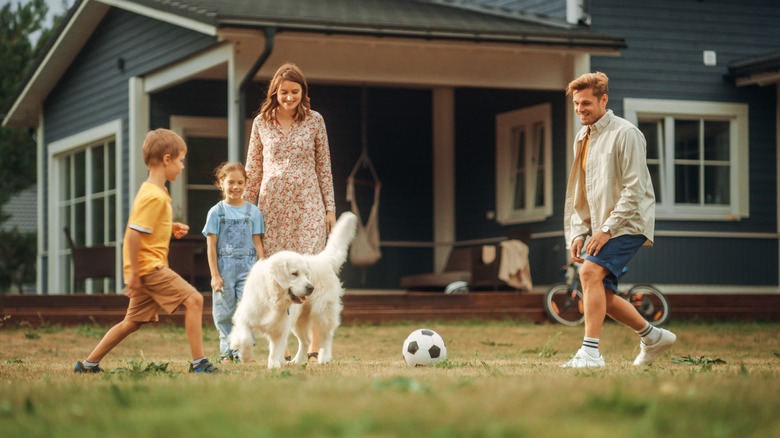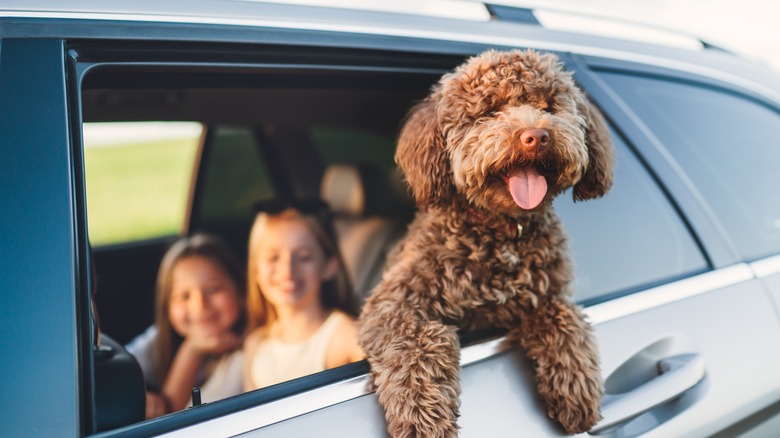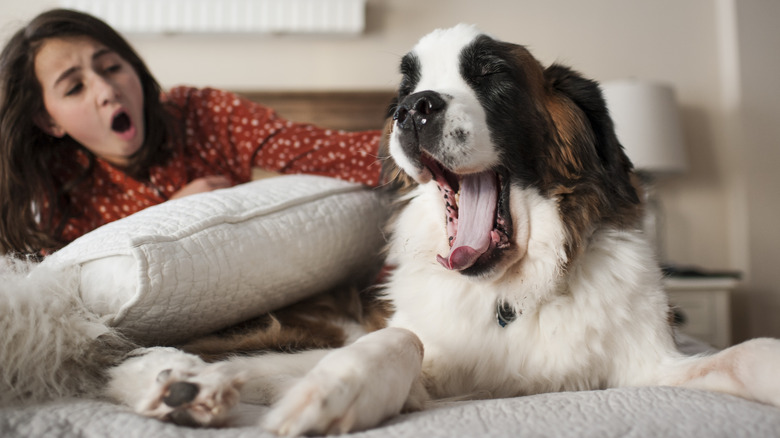14 Signs Your Dog Loves You
Supplying nutritional food, buying or making toys to play with, providing a comfortable place to sleep, and dishing out lots of kisses and cuddles are easy ways to show your canine companion that you love them. Naturally, you may wonder if your dog loves you back unconditionally. As author Clive Wynne, a psychologist and founder of the Canine Science Collaboratory at Arizona State University, explained to The Washington Post, dogs have the capacity to connect, bond, and love their people. They're also able to fall in love faster than humans, even if they have past trauma from abandonment or abuse.
Dogs express their love for their pet parents in many different ways, from a subtle smile to a more obvious cuddle session. Research has also shown that a canine's oxytocin levels go up just as humans do when they show affection towards each other (via Science). When you notice all the little things your dog does to show you they care, make sure you let them know how much you love them, too!
They lick you
You may kiss your dog's head to express your affection, and they may reciprocate by giving you a big, wet lick on your face, hands, or feet. Canines learn to lick from puppyhood. They're taught by their mother, who licks them from the moment of their birth. She performs this action both to clean her puppies and connect with them. In turn, they show their mother and littermates affection through their tongues. In a similar manner, your dog may lick you because they love you. Although they may not have the best timing when giving you a big, slobbery kiss (especially when you end the exchange with saliva smeared all over your clothes), remember that this is a bonding moment.
However, sometimes your pup might lick you excessively to communicate a problem or need. Certain dogs exhibit this behavior when they feel stressed or anxious. They may have separation anxiety and lick you non-stop once you arrive home because they've struggled to get through the day without you. Loud noises and new environments can also make them feel stressed. If it's around dinner time, they might lick you a little more than usual to tell you they're hungry. Read your dog's body language and attempt to decipher what they're trying to say.
They wag their tail when you walk into view
If a dog wags their tails, it can mean many different things, which aren't all positive. However, if they swing their tail around so fast that it looks like they may lift off the ground and have a relaxed but playful demeanor, they're likely thrilled to have you around. Dogs move their tails in response to their emotions. If they're afraid, they put their tail between their legs. But a fast tail wag usually means your dog is happy to see you. The faster the wag, the greater the emotion. If your dog is excited simply because you've entered the same room, it's probably because they love you.
When you encounter a dog you're unfamiliar with, don't take their wagging tail as a sign that you can approach them or that they're happy you're there. It's also important to look at the rest of their body language. Aggressive dogs often hold their tails up high and wag fast. However, they'll usually also have an intimidating stare, raised hair, and curled lips. Never determine a dog's emotion by their tail alone because they could be wagging to express a range of feelings.
They give you their toys
If your dog brings you their toys, the obvious conclusion is that they want to play. However, it could also mean that they crave your attention and want to connect. If the toy in question is broken, it's likely a sign that they care for and trust you enough to solve their problem. "Some dogs will show their affection for you and faith in your intelligence by bringing you items that need 'fixing,'" Michelle L. Szydlowski, veterinary technician and an anthrozoology instructor at Beacon College in Leesburg, Florida, explained to Business Insider.
Your dog is also smart enough to understand that sharing their toys with you will likely result in more fun than just playing with them alone. They know you'll probably end up in a game of tug-of-war or fetch with them. If your dog presents you with a toy when you come home, it could be because they missed you while you were out and want to spend time together. Playing with your dog is good for their health and the bond you share, so make the most of the opportunity.
They cuddle up next to you
Dogs that like to cuddle and fall asleep next to their people feel safe and connected to them. Your pup might like to snuggle you on the couch while you're watching TV or try to sleep with you in your bed. If they're fast asleep with their tummy up, that's another sign that they feel incredibly safe with you because exposing their stomachs makes them more vulnerable. "These dogs are going against their natural instinct to protect themselves while sleeping, which means they are very bonded to their environments," animal trainer Brandy Diaz told PetMD.
Opinions vary about whether canines should be allowed to sleep with their humans. However, as reported by the American Kennel Club (AKC), if your dog is well-behaved and you're happy to share your bed with them, it can be beneficial as it brings comfort to you and them and strengthens your bond. If your dog is aggressive or displays resource guarding issues, having them snooze in a separate area would be a better option until a professional addresses their behavior. Chat with your vet about how to get your dog to sleep in their own bed if you're struggling to keep them out of yours. If your pooch prefers not to sleep with you at night, don't worry. It's probably because your bed is too warm or crowded or you keep them up with your snoring.
They make eye contact with you
You may catch your dog staring at you often. They do this to gather information about you by reading your emotions and body language and observing your actions. That's why they're so in tune with how you feel or always seem to know what you're about to do next. But if your dog stares adoringly into your eyes, it's because they love you and are showing affection, just as you do with someone you love. By affectionately gazing back with a relaxed face and smile, you and your pup can feel more bonded.
Note that dogs also stare into the eyes of someone they're trying to threaten, which can happen when they are guarding resources and showing aggression to another canine or person. Dogs use their eyes to express emotion, but it's not always the loving kind. If a dog makes direct eye contact with you, growls, doesn't blink, and becomes stiff in posture, quickly remove yourself from the situation. Ignoring these signs and trying to grab the item they're guarding or punishing the canine for their behavior could escalate the situation, and you could end up getting bitten.
They excitedly greet you when you come home
It doesn't matter whether you left for hours or minutes — dogs who are excited to see their people will give them an enthusiastic greeting when they get home. It's okay to join in on their elation if they do not show signs of separation anxiety or unwanted behaviors like jumping, peeing, or becoming frantic. If they do, a different approach is necessary.
It's a wonderful feeling to know you're loved and missed by your dog and that your return brings them great joy, but how you react can trigger a positive or negative response. If your pup has separation anxiety or behavioral issues, make sure to utilize a soothing approach to your arrival by talking to them in a calm voice with a relaxed face. This will help them feel happy but also at ease when you return, not over-excited to the point that they become overwhelmed and act up. It's also important to teach dogs and puppies to be comfortable home alone as soon as you bring them into your family, as this can reduce stress and anxiety.
They follow you around
Dogs are pack animals, which means they like to stay together. If your pup shadows you throughout your home, it's because they've adopted you into their group or love being around you. By following in your wake, your dog gets to spend time with you — one of their favorite activities. If they detect the sounds of construction or other unfamiliar loud noises nearby, your pooch may tail you because they're scared and feel safer in your presence. This is a normal behavior unless they get anxious when you're not around.
Some caretakers love having a little shadow, knowing their dog is always by their side. However, for others, it can be dangerous. Older and frail people can trip over canines that hover around their feet or suddenly run out in front of them, potentially resulting in serious injuries. It can also be frustrating to have to watch your every step because your dog constantly gets in your way. Putting up pet gates, keeping them busy with a toy or snack, exercising regularly, giving them plenty of attention, and turning on the TV or radio can help prevent them from following you wherever you go.
They nuzzle you
If your dog likes to brush against your legs or even rub his face against yours, it's because they're expressing affection. Such actions also cover you with their pheromones. These little nuzzles are just another way dogs indicate that they love you. If you've ever received a nuzzle from a pup, you likely understand how this small action is enough to melt your heart and brighten your outlook.
Nuzzling doesn't just fix a bad day; it's actually good for you and your dog's health. Physical contact between a human and a canine, such as nuzzles from them and petting from you, reduces blood pressure and stress and increases the good hormone, oxytocin. Oxytocin also helps form and strengthen bonds, supports healing, and has many more benefits.
They try to sit on you
Some dogs love physical contact with their favorite humans and will grab any opportunity to try and sit on them, even if they're Great Danes. Dogs don't care if they're heavy or barely fit; they want to be close to you, show you affection, and spend time together - even if it's slightly forced. They also know that being on your lap gets them cuddles and pets and most likely makes you laugh.
Some smaller breeds were bred to be "lap dogs," but how affectionate and cuddly your pup is depends on their individual personality. Even Mastiffs may try their best to be accepted as lap dogs. Other canines may attempt to plop down on your feet. This small physical contact could be enough to comfort your dog and allow them to express their appreciation for you. When you have the time to sit with your dog (or under them), take advantage of this opportunity. They're not trying to be naughty or assert dominance over you – they just want to connect.
They let you rub their tummy
If your dog is wiggly, smiley, and relaxed and happily rolls onto their back, there's a good chance that they're asking you for affection and attention. Belly rubs feel good to most canines, and they're a way for you to communicate to them that you love them back. Pups that happily roll over for belly rubs also show that they feel comfortable around you. This action can include light scratching, patting, and rubbing, though always pause after a few moments to assess their response and ensure you've read the situation correctly. Your dog might get annoyed if you scratch the center of their tummy for too long or around their nipples, so try to stick to the sides instead.
If your dog doesn't enjoy belly rubs, that's okay! A canine's stomach is a vulnerable and sensitive spot. They may have other areas that feel better when rubbed, like under their chin or behind their ears. This is also a form of affection.
They like to sleep on your clothes
Some pups sneak off with socks or pull clothes out of drawers and take them back to their bed. If your dog loves to roll in or sleep on your clothes, it could be because they want to smell like you. The scent of someone they love comforts them and makes them feel closer to them. It's similar to wearing the hoodie of someone you care about; you experience reassurance from smelling their scent.
If your pooch loves your scent, they may prefer your dirty laundry — the smellier, the better. But why does your dog steal your underwear? Because they target clothing that has made direct contact with your apocrine glands, such as underwear, bras, and sweaty workout clothes. These glands, located around areas with many hair follicles like your armpits, genitals, scalp, and nipples, release pheromones. Because dogs rely on their sense of smell to learn about the world around them, they sniff your pheromones from your dirty clothes to discover more about you.
They want to play with you
Playing together strengthens the bond between canine and caretaker, so it's important to do. If your dog wants to play, it's at least partially because they want to spend time with the person they love. How you play with your pooch may look different over time, but from puppies to older dogs, all age groups enjoy connecting with their people via a fun game. Your dog may pick you as the only individual to play with, or they could be happy have some fun with different family members, too. This does not mean they love you any less.
It's important to play with your dog every day, but it shouldn't replace your daily walks. Games such as tug-of-war, fetch, hide-and-seek, scavenger hunts, obedience training, and obstacle courses are a few great ways to keep your pup happy and active. Remember, playtime should be pleasurable for all parties, so choose games you both enjoy.
They smile at you
Just like humans, dogs have facial expressions they can control, which they use to communicate with their human companions, get attention, and signal how they feel. Happy canines have soft eyes, an inviting face, and a slightly open mouth, which looks like a smile. Dogs are even smart enough to know that by smiling, they'll make their human companion happy. They may also smile more if they see their person smiling. If that's not love, we don't know what is.
Dogs also have facial muscles that lift their eyebrows. Raising their eyebrows makes their eyes look bigger, successfully creating the "puppy dog eyes" which have captured the hearts of many. Some pups intentionally raise their eyebrows when humans look at them as another way to express themselves. They could be telling you they love you or be trying to win you over when they want to get their way.
They yawn when you do
Have you ever caught yourself yawning after observing someone else do so? Dogs do this, too, but five times more often with people they're close to than when the yawner is a stranger, according to a 2013 study published in PLOS ONE. This research also showed that the dogs who yawned after humans didn't experience a change in heart rate, meaning that they probably didn't perform the action as an anxious response but rather an empathetic one. Thus, dogs who mimic their humans' yawns may do so as an expression of love.
"Our results show that the emotional bond between people and their dogs is reciprocal," Teresa Romero, one of the researchers at the University of Tokyo who conducted the analysis, explained to NBC News. "This attachment can shape the dog's responses in a way similar to humans, that is, to be more sensitive to a familiar yawn than to a stranger," she continued. The idea that your pup likely connects with you in empathetic ways further reinforces the concept that they have the ability to form loving relationships with their humans.
